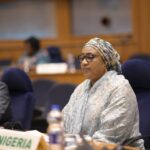By Ismail Abdulaziz
President Bola Tinubu says his administration is prioritising the health sector through massive investments and the allocation of more funds to the sector in the proposed 2024 budget.
The President made this known at the unveiling of Nigeria’s Health Sector Renewal Investment Initiative and the signing of the Health Renewal Compact by Federal, State Governments, and Development Partners in Abuja on Tuesday.
A statement by Presidential spokesman Ajuri Ngelale said that the event was a part of activities marking the Universal Health Coverage (UHC) Day, observed annually on Dec. 12.
“Delivering improved quality health is an underpinning factor in my promise of Renewed Hope to Nigerians. That hope is ignited here today with the support of all multilateral partners and agencies; health is back on the front burner.
“This occasion marks an opportunity for collective reflection and action as we recommit ourselves to the noble pursuit of health for all. The theme for this year ‘Health for All: Time for Action’ encapsulates the urgency and the determination with which we must approach this noble goal.
“Health is not merely the absence of disease but the embodiment of physical, mental, and social well-being.
“It is a fundamental human right and Nigeria’s commitment to achieving Universal Health Care Coverage is reflected in the unwavering dedication of my administration to uphold this right for every individual, young or old, in rural or urban areas,” the President said.
Noting the importance of primary healthcare in building a resilient, integrated healthcare system, Tinubu announced plans for a comprehensive revamp of physical infrastructure, equipment, and the re-training of frontline health workers starting from 2024.
To address the high cost of healthcare, the President said the Basic Health Care Provision Fund (BHCPF) will be redesigned to enhance access to essential healthcare services as outlined in the National Health Act (2014).
Tinubu said that the coordination and implementation of these initiatives must be non-partisan.
Prof. Muhummad Pate, Coordinating Minister of Health and Social Welfare, highlighted several key policy actions of the administration in the health sector, adding that the BHCPF has been redesigned as the foundational basis for a sector-wide approach.
He said that the BHCPF, comprising at least 1 per cent of the Consolidated Revenue Fund, was expected to receive at least 2.5 billion dollars in pooled and non-pooled financing from 2024 to 2026.
Pate said that there were plans to double the number of fully functional Primary Healthcare Centres (PHCs) from 8,809 to 17,618 by 2027 across all 36 states and the Federal Capital Territory (FCT).
He said that these PHCs would be linked to a comprehensive emergency care system.
Pate said that the federal government would make resource allocation, releases, and results transparent to all stakeholders, including government bodies, non-governmental partners, civil society organisations, and citizens.
He noted that the increased allocation in the proposed 2024 budget for health and social welfare sectors has demonstrated the political will of the administration to achieve the UHC and improve the health of Nigerians.
”Thanks to Mr. President, the Federal Government is making significant investments in health infrastructure and equipment for our hospitals, as well as the provision of critical commodities, the expansion of health insurance, alongside heightened attention to the welfare of the health workforce,” he said.
Pate also announced the federal government’s plan to establish a mechanism for the pooled procurement of critical pharmaceuticals in 2024 in order to lower costs and guarantee quality, making life-saving medications more affordable for the poorest Nigerians.
“In the medium term, Mr President’s initiative to unlock the healthcare value chain will see Nigeria manufacturing increasing share of its generic drugs, medical devices, and associated content, such as vaccines over time.
“This will reduce our dependency on those only keen to exploit our markets,” the Minister said.
edited by Sadiya Hamza











